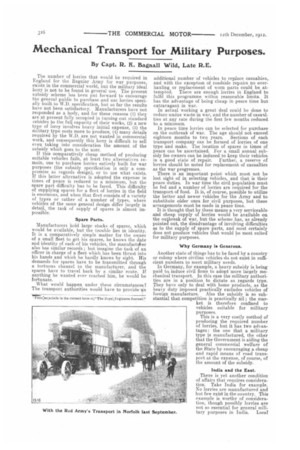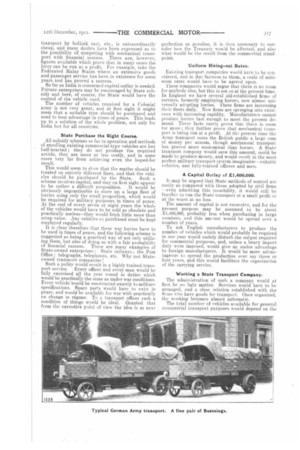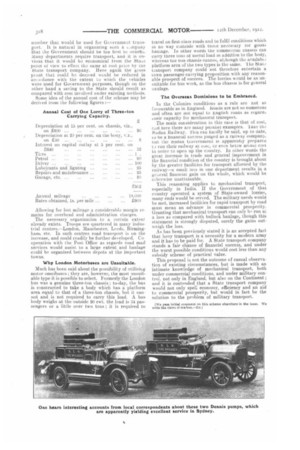Mechanical Transport for Military Purposes.
Page 4

Page 5

Page 6

If you've noticed an error in this article please click here to report it so we can fix it.
By Capt. R. K. Bagnall Wild, Late R.E.
The number of lorries that would be required in England for the Regular Army for war purposes, exists in the commercial world, but the military ideal lorry is not to be found in general use. The present subsidy scheme has been put forward to encourage the general public to purchase and use lorries specially built to W.D. specification, but so far the results have not been satisfactory. Manufacturers have not responded as a body, and for these reasons (1) they are at present fully occupied in turning out standard vehicles to the full capacity of their works, (2) a new type of lorry involves heavy initial expense, (3) the military type coats more to produce, (4) many details required by the W.D. are not wanted in commercial work, anti consequently this lorry is difficult to sell even taking into consideration the amount of the subsidy which goes to the user. If this comparatively cheap method of producing suitable vehicles fails, at least two alternatives remain, one to purchase lorries entirely built for war purposes (the subsidy specification is only a compromise as regards design), or to use what exists. If this latter alternative is adopted the expense in times of peace is reduced to a minimum, but the spare part difficulty has to be faced. This difficulty of supplying spares for a fleet of lorries in the field is enormous, and when that fleet consists of a variety of types or rather of a number of types, where vehicles of the same general design differ largely in detail, the task of supply of spares is almost impossible.
Spare Parts.
Manufacturers hold large stocks of spares, which would be available, but the trouble lies in identity. It is a comparatively simple matter for the owner of a small fleet to get his spares, he knows the date and identity of each of his vehicles, the manufactufrer also has similar records ; but imagine the task of an officer in charge of a fleet which has been thrust into his hands and which he hardly knows by sight. His demands for spares have to be transmitted through a tortuous channel to the manulacturer, and the spares have to travel back by a similar route. If anything he wanted ever reached him, he would be fortunate.
What would happen under these circumstances? The transport authorities would have to provide 'an
additional number of vehicles to replace casualties,, and with the exception of roadside repairs no overhauling or replacement of worn parts could be attempted. There are enough lorries in England to fulfil this programme within reasonable limits. It has the advantage of being cheap in peace time but extravagant in war.
in actual working a great deal could be done to reduce undue waste in war, and the number of casualties at any rate during the first few months reduced. to a minimum.
In peace time lorries can be selected for purchase on the outbreak of war. The age should not exceed. eighteen months to two years. Sections of each transport company can be formed of lorries of one type and make. The location of spares in times of peace can be ascertained. For a small annual subsidy fee owners can be induced to keep their vehicles, in a good state of repair. Further, a reserve of lorries should be noted for replacement of casualties as the war progresses. There is an important point which must not be lost sight of in selecting vehicles, and that is their peace duties. In war time the civil population must. be fed and a number of lorries are required for the transport of food. It is, of course, possible to utilize the better and newer vehicles for the Army and to. substitute older ones for civil purposes, but these arrangements must be made in peace time. It is thought that by these means a very serviceable. and cheap supply of lorries would be available on. the outbreak of war, but the scheme has, as already pointed out, the disadvantage of involving difficulties as to the supply of spare parts, and most certainly does not produce vehicles that would be most suited' for military purposes.
Why Germany is Generous.
Another state of things has to be faced by a country or colony where civilian vehicles do not exist in sufficient numbers to meet military needs,
In Germany, for example, a heavy subsidy is being
paid to induce civil firms to adopt more largely mechanical transport. In this case the military authori ties are in a position to dictate as regards type. They have only to deal with home products, as the heavy duty imposed practically excludes vehicles of foreign manufacture. Also the subsidy is so substantial that competition is practically nil ; the market is therefore confined to vehicles suitable for military purposes. This is a very costly method of producing the required number of lorries, but it has two advantages: the one that a military type is manufactured, the other that the Government is aiding the general commercial welfare of the State by encouraging a cheap and rapid means of road transport at the expense, of course, of the amount of the subsidy.
India and the East.
There is yet another condition of affairs that requires consideration. Take India for example. No lorries are manufactured and but few exist in the country. This example is worthy of considers: tion, though possibly lorries are not so essential for general mili
tary purposes in India. Loco,/
transport by bullock cart, etc., is extraordinarily cheap, and many doubts have been expressed as to the possibility of competing with mechanical transport with financial success. There are, however, figures available which prove that in many cases the lorry can be run at a. profit. For example, take the Federated Malay States where an extensive goods and passenger service has been in existence for some years and has proved a success. So far as India is concerned capital outlay is needed. Private enterprises may be encouraged by State subsidy and here, of course, the State would have the control of the vehicle used.
The number of vehicles required for a Colonial army is not very great, and at first sight it might seem. that. a. suitable type should be purchased and used to best advantage in times of peace. This leads up to a solution of the whole problem, not only for India but for all countries.
State Purchase the Right Course.
All subsidy schemes so far in operation and methods of enrolling existing commercial-type vehicles are but half-hearted ; they do not produce the required article, they are more or less costly, and in some cases very far from achieving even the hoped-for result.
This would seem to show that the matter should be treated on entirely different lines, and that the vehi cles should be purchased by the State. Such a scheme involves capital, and may on first sight appear
to be rather a difficult proposition. It would be obviously impracticable to store up a large fleet of lorries using -only the small proportion, which would be required for military purposes in times of peace. At the end of every seven or eight years the whole of the vehicles would have to be sold as obsolete and practically useless—they would fetch little more than scrap value. Any vehicles so. purchased must be kept employed regularly.
It is clear therefore that these war lorries have to be used in times of peace, and the following scheme is suggested as being a practical way of not only utilizing them, but also of doing so with a fair probability of financial success. There are many examples of State-owned enterprizes State railways ; the Post Office ; telegraphs, telephones, etc. Why not Stateowned transport companies ? Such a policy would result in a highly trained transport service. Every officer and every man would be fully exercised all the year round in duties which
would be practically the same as under war conditions. Every vehicle-Would be constructed exactly to military
specifications. Spare parts would have to exist in peace. and would be available for war with practically no change in regime. To a transport officer such a condition of things would be ideal. Granted that from the executive point of view the idea is as near perfection as possible, it is then necessary to consider how the Treasury would be affected, and also what would be the result from the commercial standpoint_
Uniform Hiring-out Rates.
Existing transport, companies would have to be considered, and in due fairness to them, a scale of minimum rates would have to be agreed upon.
These companies would argue that there is no room
for anybody else, but this is not so at the present time.
In England we have several old-established firms of carriers, formerly employing horses, now almost uni versally adopting lorries. These firms are increasing their fleets daily. New firms are springing into exist ence with increasing rapidity_ Manufacturers cannot produce lorries fast enough to meet the present demand. These facts surely prove that, there is room tor more ; they further prove that mechanical transport is being run at a profit. At th6 present time the Army transport costs the British public a large sum of money per annum, though mechanical transport has proved more economical than horses. A State transport company would save this amount, could be made to produce money, and would result in the most perfect military transport system imaginable—suitable vehicles, and fully-trained officers and men.
A Capital Outlay of £1,400,000.
It may be argued that State methods of control are costly as compared with those adopted by civil firms —even admitting this possibility, it would still be feasible to run the State transport at a small profit or at the worst at no loss.
The amount of capital is not, excessive, and for the present purpose may be assumed to be about 21,400,000, probably less when purchasing in large numbers, and this amsunt would be spread over a number of years.
To ask English manufacturers to produce the number of vehicles which would probably be required in one year would unduly disturb the output required for commercial purposes, and, unless a heavy import duty were imposed, would give an undue advantage to foreign manufacturers. It would be more advantageous to spread the production over say three or four years, and this would facilitate the organization of the carrying service.
Working a State Transport Company.
The administration of such a company would at first be no light matter. Services would have to he arranged, and a close relation established with the firms who have goods for transport. Once organized, the working becomes almost automatic.
The total number of vehicles available for general commercial transport purposes would depend on the number that would be used for Government transport. It is natural in organizing seen a eampany that the Government should be tile first to oeneht. tatauy departments require transport, and it is obvious that it would be economical from the State point of view to efiect the same at cost pi ice by the state transport company. Here again the gross ont that could be derived would be reduced in aceal danee with the extent to which the vehicles were used for Government purposes, though on the other hand a saving to the State should result as compared with cost involved under existing methods. Some idea of the annual cost of the scheme may be derived trot» the following figures :— Annual Cost of One Lorry of Three-ton Carrying Capacity.
Allowing for lost mileage a considerable margin remains for overhead and administration charges.
The necessary organization to a certain extent already exists. Troops are quartered in many industrial centres.—London, Manchester, Leeds, Birmingham! etc. In such centres road transport is on the increase, and could readily be further developed. Co operation with the Post Office as regards road mail services would assist to a large extent and haulage -could be organized between depots at the important towns.
Why London Motorbuses are Unsuitable.
Much has been said about the possibility of utilizilat motor omnibuses ; they are, however, the most unsuitable type it is possible to select. Formerly the London bus was a genuine three-ton chassis ; to-day, the bus is constructed to take a body which has a platform area equal to that of a three-ton chassis, but it cannot and is not required to carry this load. A bus body weighs at the outside 20 cwt. the load is 34 passengers or a little over two tons ; it is required to
travel on first-class roads and to fulfil conditions which in no way coincide with thm,e necessary tor goods haulage. In other words the commercial chassis can early three tons of useful load in addition to the body, whereas tne bus chassis cannot, although the availabe) platform area of the two types is the same. '1 he Statst transport company could not therefore entertain a town passenger-carrying proposition with any reasonable prospect of success. The lorries would be as unsuitable for bus work, as the bus chassis is for general itaulage.
The Overseas Dominions to be Embraced.
In the Colonies conditions as a rule are not so favourable as in England. !toads are not so numerous and often are not equal to tenglish roans as regaras weir capacity for mechanical transport.
The main consideration in this ease is that of cost., end here there are many parallel examples. laae the Sudan Railway. This can hardly be said, up to date, to be a financial saceess ntaged as a railway company, but the Sudan tiovernment is apparently prepared to run their railway at cost, cr even below actual cost in order to open up the country. in other words the great increase in trade and general improvement in the financial condition of the country is brought about by the greater facilities for transport afforoed by the railway—a small loss in one department results in a ge.ieral financial gain on the whole, which would be otherwise unattainable.
This reasoning applies to mechanical transport, especially in India. If the Government of that country operated a system of State-owned lorries, many ends would he served. The military needs would he met, increased facilities for rapid transport by road must mean an advance in commercial prosperity. Granting that mechanical transport can only be run at a loss as compared with bullock haulage, though this statement is strongly disputed, surely the gains outweigh the loss.
As has been previously stated it is an accepted fact that lorry transport is a necessity for a modern army and it has to be paid for. A State transport company stands a fair chance of financial success, and under the worst possible conditions would cost less than any subsidy scheme of practical value.
This proposal is not the outcome of casual observation of existing circumstances, but is made with an intimate knowledge of mechanical transport, both under commercial conditions, and under military control. not only in England, but also on the Continent ; and it is contended that a State transport company would not only spell economy, efficiency and an aid to commercial prosperity, but would in fact be the solution to the problem of military transport.
[We pass initial comment on this scheme elsewhere in the issue. We nvite the views of reaiers.--End
























